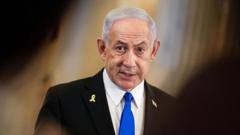Are Australia-Israel Relations Really in Crisis or Just Business as Usual?

Published: 2025-09-02 23:07:09 | Category: technology
This article explores the recent protests in Australia advocating for Palestinian rights, the changing dynamics of Australia-Israel relations, and the implications of these developments on domestic and international fronts. Amid growing public outrage and diplomatic tensions, the Australian government has made moves that reflect shifting sentiments regarding Israel's actions in Gaza.
Last updated: 30 October 2023 (BST)
Key Takeaways
- Mass protests in Australia on 24 August called for stronger action against Israel's actions in Gaza.
- Australia's recognition of a Palestinian state has led to significant diplomatic fallout with Israel.
- The International Association of Genocide Scholars labelled Israel's actions in Gaza as genocide.
- Public sentiment in Australia is increasingly critical of Israeli policies, influencing government responses.
- Australia's arms trade with Israel remains a contentious issue amid calls for sanctions.
The Recent Protests: A Reflection of Public Sentiment
On 24 August, tens of thousands of Australians gathered in major cities to protest against the Israeli government's actions in Gaza and to advocate for Palestinian rights. This marked a significant moment in a month of escalating public dissent, as demonstrators called for an end to arms trade with Israel and sanctions against the Israeli government. The protests served to reinforce pressure on the Australian government to take a more definitive stance on the ongoing humanitarian crisis in Gaza.
Historical Context
The protests were framed by a dramatic backdrop of shifting Australia-Israel relations. Notably, on 3 August, a colossal demonstration across Sydney Harbour Bridge drew large crowds, marking one of Australia's largest political demonstrations. These events occurred during a period of diplomatic deteriorations, with accusations of interference and cancelled visas exacerbating tensions between the two nations.
Australia-Israel Relations at a Low Point
Diplomatic relations between Australia and Israel have reached unprecedented lows in recent weeks. Following the public outcry, the Australian government announced a conditional recognition of a Palestinian state, a move that has drawn mixed reactions. Prime Minister Anthony Albanese's decision followed conversations with Israeli Prime Minister Benjamin Netanyahu, who was reportedly in denial about the humanitarian situation in Gaza.
The International Response to the Humanitarian Crisis
In a striking development, the International Association of Genocide Scholars declared that Israel's actions in Gaza amount to genocide, citing extensive attacks on essential facilities and widespread civilian casualties. This declaration has intensified scrutiny of Israel's military operations and the humanitarian impact, leading to calls for a reassessment of international support for Israel.
Domestic Reactions and Political Implications
The announcement of Palestinian state recognition has not only drawn the ire of pro-Israel advocates but has also been met with scepticism from pro-Palestinian groups. Activists argue that the government's responses have been insufficient and lack the necessary material measures required under international law. Amal Naser, a Palestinian activist, described the government's actions as "nowhere near proportionate to the situation at hand".
Mixed Reactions from Community Leaders
Community leaders from both sides of the debate have expressed disappointment with the government's approach. Alex Ryvchin, from the Executive Council of Australian Jewry, characterised the recognition as "gesture politics" that undermines peace efforts. The backlash illustrates the complexities of the situation, where both pro-Israel and pro-Palestinian groups are calling for more decisive action from the Australian government.
Escalating Tensions: Netanyahu's Response
Netanyahu's response to Australia’s recognition of Palestine was vehement. He accused Albanese of exacerbating antisemitism and described the decision as appeasement towards Hamas. This marked a significant escalation in rhetoric, reflecting the deepening rift between the two nations. Following this, Australia took the unprecedented step of denying entry to far-right Israeli politician Simcha Rothman, further complicating diplomatic relations.
The Expulsion of Iran's Ambassador
In a surprising turn of events, Australia expelled Iran's ambassador based on allegations of inciting antisemitic attacks. This decision, juxtaposed with the recognition of Palestine, highlights the intricate diplomatic balancing act Australia is attempting to maintain. While Israel welcomed the expulsion, the Australian government has denied that Israeli intervention influenced the decision.
Public Sentiment: A Growing Call for Action
The public sentiment in Australia has shifted markedly, with a clear demand for stronger actions against Israel’s policies. The large protests indicate a significant portion of the population is dissatisfied with the government’s current stance. Activists are calling for sanctions on Israel and an end to the arms trade, particularly concerning parts used in military operations in Gaza.
Ongoing Humanitarian Concerns
The humanitarian situation in Gaza has continued to deteriorate, with over half a million people facing catastrophic conditions. Aid organisations have accused Israel of systematically obstructing food and medical aid from entering the territory, contributing to what many call a man-made famine. This ongoing crisis has fuelled public outrage and demands for governmental action in Australia.
The Future of Australia-Israel Relations
As Australia grapples with its diplomatic ties to Israel, experts suggest that the fallout may not have lasting impacts. Ian Parmeter from the Australian National University has noted that while the relationship has soured, the human connections between Australia and Israel remain strong. However, the government's recent gestures appear to be a response to public demands rather than a substantive shift in policy.
Addressing the Arms Trade and Sanctions
Australia's involvement in the arms trade has come under scrutiny, particularly regarding components used in Israeli military aircraft. The government maintains that it only supplies non-lethal parts, yet this remains a contentious issue among activists who argue that even this involvement contributes to the ongoing conflict. Calls for stronger sanctions against Israel reflect the growing frustration among the public and advocacy groups.
Conclusion: A Diplomatic Tightrope
The ongoing tensions between Australia and Israel illustrate the complexities of international diplomacy amidst a humanitarian crisis. As public sentiment shifts and demands for action grow louder, the Australian government faces increasing pressure to take a stand on the issues of Palestinian rights and Israeli actions in Gaza. While some view recent governmental actions as inadequate, others express hope for a more balanced and humane foreign policy moving forward.
With the situation continuing to evolve, the question remains: how will Australia navigate its diplomatic relationships while responding to domestic and international pressures? #AustraliaIsraelRelations #PalestinianRights #GazaCrisis
FAQs
What sparked the protests in Australia regarding Palestine?
The protests were sparked by growing public outrage over Israel's actions in Gaza and calls for the Australian government to take a more definitive stance in support of Palestinian rights.
What was the response from the Australian government to the protests?
The Australian government announced a conditional recognition of a Palestinian state and faced backlash from both pro-Israel and pro-Palestinian groups.
How has Israel reacted to Australia's recognition of Palestine?
Israeli Prime Minister Netanyahu condemned Australia's recognition as appeasement towards Hamas and accused the government of fuelling antisemitism.
What are the demands of pro-Palestinian activists in Australia?
Pro-Palestinian activists are demanding stronger sanctions against Israel, an end to the arms trade, and an overall more robust government response to the humanitarian crisis in Gaza.
What is the current humanitarian situation in Gaza?
The humanitarian situation in Gaza is dire, with reports of widespread starvation and a lack of access to essential services due to ongoing military operations and blockades.



